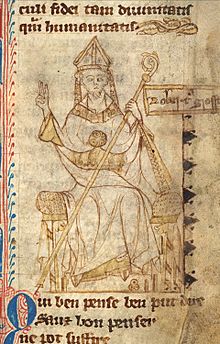ရောဘတ် ဂရိုစတေး
ရောဘတ် ဂရိုစတေး (အင်္ဂလိပ်: Robert Grosseteste[n ၁], /ˈɡroʊstɛst/; လက်တင်: Robertus Grosseteste; c. 1168 – 8 or 9 October 1253)[၁၁] သည် အင်္ဂလိပ် နိုင်ငံရေးသမား၊ တွေးခေါ်ပညာရှင်၊ ဘာသာရေးဆရာ၊ သိပ္ပံပညာရှင်နှင့် လင်ကွန်းရှီးယားနယ် ဂိုဏ်းအုပ်ဘုန်းတော်ကြီးတစ်ပါးဖြစ်သည်။ (၁၄ ရာစုအစောပိုင်း ရာဇဝင်ကျမ်းပြုသူ နီကိုလက်စ် ထရဲဗစ်အရ) သာမန်မိဘများမှ ဆဖာ့ခ်ကောင်တီ (Suffolk) တွင် ဖွားမြင်ခဲ့သော်လည်း အလယ်ခေတ်လွန် စာပေတစ်ခုအရ စထရာ့ဒ်ဘရွတ်ခ်ရွာ (Stradbroke) တွင် မွေးသည်ဟု ဆိုထားသည်။[၁၂] သေလွန်သောအခါ အင်္ဂလန်တွင် သူတော်စင်အဖြစ် သတ်မှတ်ကြည်ညိုကြသော်လည်း တရားဝင်အခမ်းအနားဖြင့် သူတော်စင်အဖြစ်သတ်မှတ်ခြင်းသည်ကား မအောင်မြင်ခဲ့ပေ။ အေ. စီ. ခရွန်ဘီးက အလယ်ခေတ် အောက်စဖို့ဒ်မြို့၌ သိပ္ပံနည်းကျ အတွေးအခေါ်ဓလေ့ကို စတင်တည်ထောင်သူ၊ တစ်နည်းအားဖြင့် အင်္ဂလိပ်တို့၏ ခေတ်သစ်ဉာဏပိုင်းဆိုင်ရာ ဓလေ့စဉ်လာကို တည်ထောင်သူဟု ခေါ်ဝေါ်ခဲ့သည်။
ရောဘတ် ဂရိုစတေး | |||||||||||||||||||
|---|---|---|---|---|---|---|---|---|---|---|---|---|---|---|---|---|---|---|---|
| Bishop of Lincoln | |||||||||||||||||||
 An early 14th-century portrait of Grosseteste[၁] | |||||||||||||||||||
| အပ်နှင်းခြင်း | ၁၂၃၅ | ||||||||||||||||||
| ပြီးဆုံးခြင်း | ၁၂၅၃ | ||||||||||||||||||
| ယခင် | Hugh of Wells | ||||||||||||||||||
| ဆက်ခံ | Henry of Lexington | ||||||||||||||||||
| ပုဂ္ဂိုလ်ရေးရာ | |||||||||||||||||||
| မွေးဖွား | c. 1168 စတိုးရွာ[၂] ဆဖာ့ခ်ကောင်တီ | ||||||||||||||||||
| ကွယ်လွန် | 8 or 9 October 1253 (aged about 78) ဟန်တင်ဒန်ရှီးယား၊ ဘာ့ခ်ဒန်ရွာ
| ||||||||||||||||||
မှတ်စု
ပြင်ဆင်ရန်- ↑ The name is the Norman French form of Robert Greathead (လက်တင်: Robertus Capito, Capitus, Megacephalus, or Grossum Caput) or the gallicized Robert Grosstête (/ˈɡroʊsteɪt/ GROHS-tayt; လက်တင်: Robertus Grossetesta or Grossatesta).[၈] Also known as Robert of Lincoln (လက်တင်: Robertus Lincolniensis, Linconiensis, &c.) or Rupert of Lincoln (လက်တင်: Rubertus Lincolniensis, &c.).[၉][၁၀]
ကိုးကား
ပြင်ဆင်ရန်- ↑ Brev. Hist. Ang. Scot. &c. (Harleian MS 3860 Archived 6 September 2021 at the Wayback Machine., f. 48).
- ↑ Richard of Bardney in his work 'The Life of Robert Grosstête' gives Stow as Grosseteste's birthplace, without mentioning Suffolk. R. W. Southern (1986, p. 77) notes that there are three Stows in Suffolk.
- ↑ Steven P. Marrone, William of Auvergne and Robert Grosseteste: New Ideas of Truth in Early Thirteenth Century, Princeton University Press, 2014, p. 146.
- ↑ Charles Edwin Butterworth, Blake Andrée Kessel (eds.), The Introduction of Arabic Philosophy Into Europe, BRILL, 1994, p. 55.
- ↑ Hackett၊ Jeremiah M.G. (1997)၊ "Roger Bacon: His Life, Career, and Works"၊ Roger Bacon and the Sciences: Commemorative Essays၊ Studien und Texte zur Geistesgeschichte des Mittelalters, No. 57၊ Leiden: Brill၊ p. 10၊ ISBN 90-04-10015-6
- ↑ Edith Wilks Dolnikowski, Thomas Bradwardine: A View of Time and a Vision of Eternity in Fourteenth Century Thought, BRILL, 1995, p. 101 n. 4.
- ↑ Tom Sorell (ed.), The Cambridge Companion to Hobbes, Cambridge University Press, 1996, p. 155 n. 93.
- ↑ G.M. Miller, BBC Pronouncing Dictionary of British Names (London: Oxford UP, 1971), p. 65.
- ↑ "Grosseteste, Robert (1168–1253)", CERL Thesaurus.
- ↑ Grosseteste, Robert 1175?–1253", OCLC WorldCat Identities.
- ↑ Lewis၊ Neil (2019)၊ "Robert Grosseteste"၊ The Stanford Encyclopedia of Philosophy
- ↑ Giles E. M. Gasper, et al, Knowing and Speaking: Robert Grosseteste's 'De artibus liberalibus' 'On the Liberal Arts' and 'De Generatione Sonorum' 'On the Generation of Sounds' (Oxford University Press, 2019), pp. 9-35 and 199-225.
| ဤ အတ္ထုပ္ပတ္တိ ဆောင်းပါးမှာ ဆောင်းပါးတိုတစ်ပုဒ် ဖြစ်သည်။ ဖြည့်စွက်ရေးသားခြင်းဖြင့် မြန်မာဝီကီပီးဒီးယားကို ကူညီပါ။ |